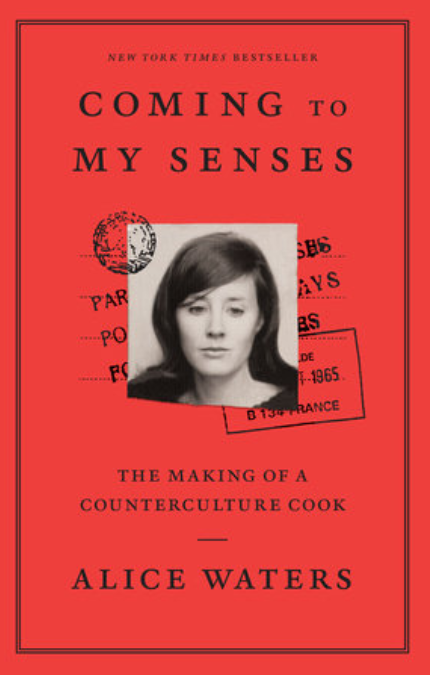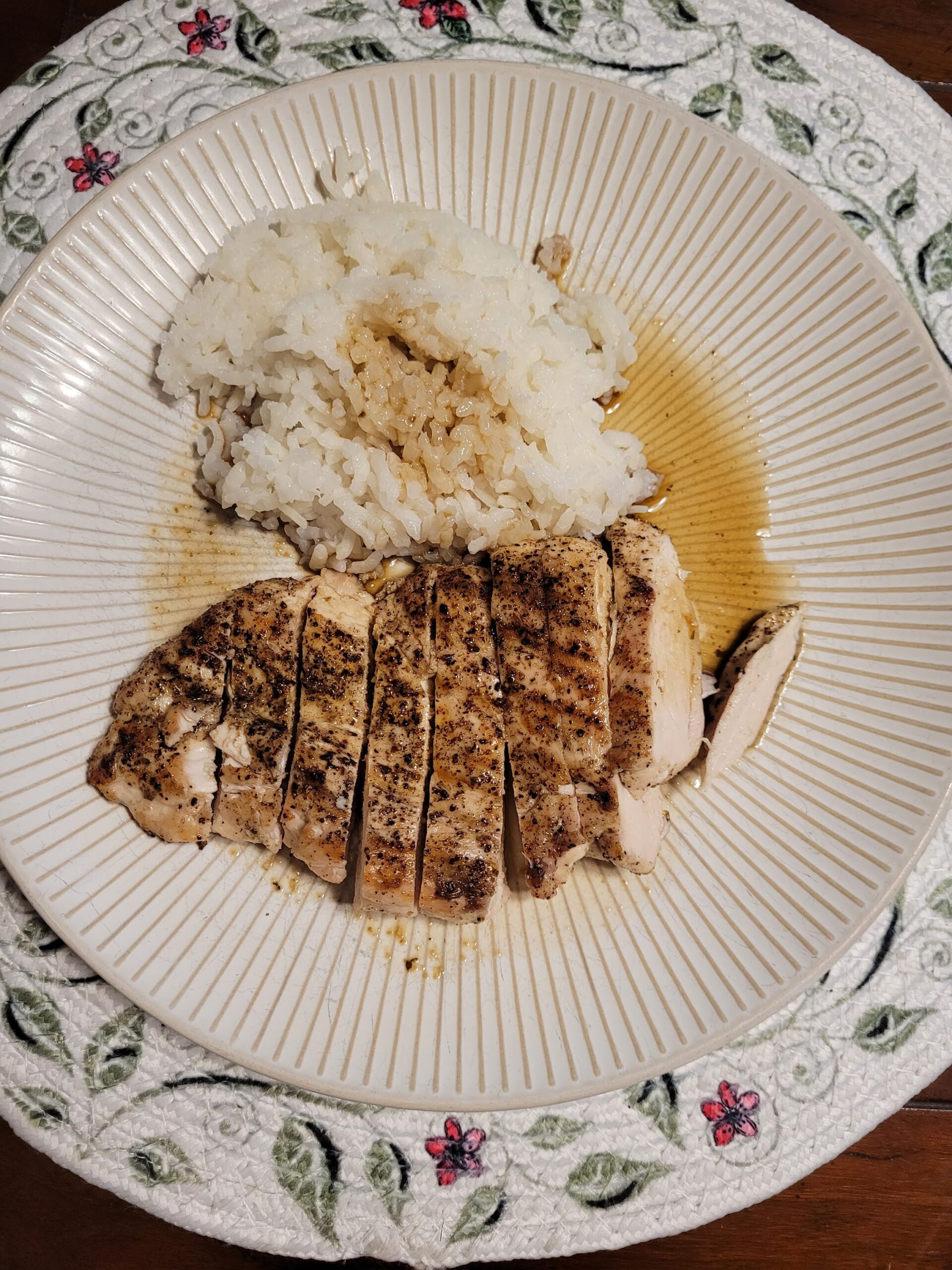Coming to My Senses: The Making of a Counter Culture Cook by the indomitable Alice Waters is the August/September feature for Cook the Books. Claudia from Honey from Rock is hosting and you can read her announcement post here.
About the Book:

The New York Times bestselling and critically acclaimed memoir from cultural icon and culinary standard bearer Alice Waters recalls the circuitous road and tumultuous times leading to the opening of what is arguably America’s most influential restaurant.
When Alice Waters opened the doors of her “little French restaurant” in Berkeley, California in 1971 at the age of 27, no one ever anticipated the indelible mark it would leave on the culinary landscape—Alice least of all. Fueled in equal parts by naiveté and a relentless pursuit of beauty and pure flavor, she turned her passion project into an iconic institution that redefined American cuisine for generations of chefs and food lovers. In Coming to My Senses Alice retraces the events that led her to 1517 Shattuck Avenue and the tumultuous times that emboldened her to find her own voice as a cook when the prevailing food culture was embracing convenience and uniformity. Moving from a repressive suburban upbringing to Berkeley in 1964 at the height of the Free Speech Movement and campus unrest, she was drawn into a bohemian circle of charismatic figures whose views on design, politics, film, and food would ultimately inform the unique culture on which Chez Panisse was founded. Dotted with stories, recipes, photographs, and letters, Coming to My Senses is at once deeply personal and modestly understated, a quietly revealing look at one woman’s evolution from a rebellious yet impressionable follower to a respected activist who effects social and political change on a global level through the common bond of food. (Taken from Penguin Random House.)
About the Author:
Alice Waters is a chef and the founder/owner of Chez Panisse in Berkeley, California. She has won numerous awards, including the National Humanities Medal, the French Legion of Honor Medal, the Cavaliere of the Italian Republic, the Julia Child Award, and three James Beard Awards. As vice president of Slow Food International and founder of the Edible Schoolyard Project, she has helped bring food awareness to people of all ages all over the world. Learn More about Alice Waters (Taken from Penguin Random House.)
What I thought….
Hmmm…. This is a hard question. Back when being a locavore was the height of hipness (about 15 years ago), I adored Alice. When my sister gave me a copy of The Art of Simple Food for my birthday, I told her it was the best gift ever. I even almost took her side during the whole Bourdain vs. Waters wars. I devoured Alice Waters and Chez Panisse by Thomas McNamee in 2007 or 2008.
Segue alert….
Alice Waters and Chez Panisse by Thomas McNamee was loaned to me by an acquaintance who knew the family of Stephen Singer (Waters’ husband and father to Fanny). Singer was born in Tulsa and this person helped advise the family financially or something like that. I remember that McNamee book because of the Tulsa connection but I really don’t remember much more about it. I don’t think it portrayed Alice in the best light.
OK. Back to the book at hand, The Making of a Counter Culture Chef. There were times when the only reason I kept reading was because it was Alice Waters. At times I thought her writing was very stilted and almost unfeeling. (Just the facts, ma’am.) I am being a bit facetious but it was like, “I went to college. I went to France. I went to Montessori training and I bit a kid. I decided I was good at cooking. I opened a cafe/bistro.” There was a bit of name dropping…of those involved in the real counter culture in the Berkley area and then later major food personalities like Marion Cunningham.
I’m being harsh, I know.
It was amazing to me that she was able to make Chez Panisse into the lasting institution that it is. She creates a family but, again, I wonder how much luck was involved. When her father offers to help with the psychology of business and working groups, she feels, “The last thing I wanted was a touch-feely T-Group of people working through their feelings. I don’t even like talking about it—it was excruciating” (28). Again, this unemotional quality is evident in her writing.
She does let some feelings show, especially when she remembers France and “that first taste of apricot jam on a baguette that was still hot from the oven” (107).
She professes to being the first proponent of garlic and bringing it into main stream American cooking. Maybe she was. She mentions with pride the two garlic desserts they served, one sherbet with white wine and white fruits and the other with red wine and thyme (37). She also had the idea of feeding only garlic to a sow so the piglets would be drinking garlic-infused milk (37). Hmmm….
There were a few times she bordered on the poetic:
Something can be lost in writing down a recipe. People can become so focused on measuring ingredients….This is my favorite recipe: ‘Go get some perfectly ripe figs in August, put them on a plate, and eat them.’ No, my favorite recipe is: ‘Go cut some mint from the garden, boil water, and pour it over the mint. Wait. And then drink.’ That’s my favorite recipe. (144)
I guess I really would have preferred a lot more about Chez Panisse and less about Waters’ life. Or, maybe a better, more emotional, personal retelling of that life would have been in order.
Right after I finished Coming to My Senses, I read her Chez Panisse Cafe Cookbook and honestly, I enjoyed it much more. There was a poetry in her writing. I will go back to that quote above about her not being touchy-feely. It’s obvious that she prefers writing about food and not herself.
I think I will actually write more about that book (Chez Panisse Cafe Cookbook) here soon. For the recipe for this post, I did choose one from that cookbook. I halved this recipe and updated the directions a bit.
Grilled Chicken Breasts au Poivre
Based on a recipe from Chez Panisse Cafe Cookbook by Alice Waters
Ingredients
- 2 chicken wings
- extra-virgin olive oil
- 1/4 c. white wine
- 1 quart good chicken stock
- 1 sprig each of parsley and thyme
- 1 garlic clove
- 1 1/2 t. freshly ground peppercorns, divided
- Salt
- 2 large boneless chicken breasts
- red wine vinegar
Instructions
- Chop the wing into three parts: the tip, the wingette (flat) and the drumette. Prepare the sauce. In a large, deep saucepan, brown the chicken wing pieces in a little olive oil. When they are well-browned, deglaze the pan with the white wine. Add the chicken stock. Bring to a boil, reduce to a summer, and add the parsley, thyme, garlic, ½ teaspoon of the peppercorns. Simmer for one hour. Skim off fat and strain. Return to the saucepan and reduce until rich and slightly thickened. (Reduce until you have about ¾ cup of sauce.)
- Prepare an outdoor grill (or grill pan) to moderately hot. Pound the chicken breasts to flatten them slightly. Coat the breasts with olive oil and season with the remaining 1 t. pepper and salt. Gently grill the chicken breasts, rotating them frequently for even browning (about 8 minutes in all).
- Let the chicken stand for a few minutes while you warm up the sauce. Check the seasoning in the sauce and add a few drops of red wine vinegar.
- Serve the breasts whole or sliced. Spoon the sauce over and serve.
The sauce can be prepared one day ahead of time.
Yield: 2
Waters uses chicken legs hacked into four pieces with a cleaver. I thought the wings would be easier.

I served this with rice and some leftover Waldorf Salad (which didn’t make the photo). This was not the most attractive meal to photograph. My sauce never got thick and I did reduce it down to 3/4 cup almost exactly. While it was good, I’m not sure it was worth the time.
I am going to dive into the Chez Panisse Cafe Cookbook more and revisit The Art of Simple Food. By the way, I just scanned through the dessert section of The Art and the recipes are so simple but delicious. I’m saving Strawberries in Orange Juice and Summer Fruit Compote for next season. If I have time, I will try the Winter Fruit Compote and maybe I will post it here, too. It’s full of great dried fruits and fresh orange flavor.
Thank you, Claudia, for hosting. This book was not on my radar and I am glad I read it. I’m more thankful that I have two of her cookbooks though.

I’m hosting the October/November selection, Maame by Jessica George. Here’s an edited publisher’s blurb for that book:
Maame (ma-meh) has many meanings in Twi but in my case, it means woman. It’s fair to say that Maddie’s life in London is far from rewarding. With a mother who spends most of her time in Ghana (yet still somehow manages to be overbearing), Maddie is the primary caretaker for her father, who suffers from advanced stage Parkinson’s. At work, her boss is a nightmare and Maddie is tired of always being the only Black person in every meeting. When her mum returns from her latest trip to Ghana, Maddie leaps at the chance to get out of the family home and finally start living. But it’s not long before tragedy strikes, forcing Maddie to face the true nature of her unconventional family, and the perils—and rewards—of putting her life on the line. Smart, funny, and deeply affecting, Jessica George’s Maame deals with the themes of our time with humor and poignancy: from familial duty and racism, to female pleasure, the complexity of love, and the life-saving power of friendship. Most importantly, it explores what it feels like to be torn between two homes and cultures―and it celebrates finally being able to find where you belong.
I hope you can join us. Posts’ deadlines will be November 30, 2025. Look for an announcement post soon at Cook the Books.

On the book, I totally agree with you. Another book suggestion without first reading. Oh well.
I still would have read it and I’m still a fan.
I was all into the Locavore movement and I still try to eat locally but it’s a little harder in Michigan than in California, for sure.
We rely more on farmers markets now than our own garden. Not enough time.
As you said in your comment, your reaction to the book was very different from mine!
[…] Cook the Books Club recently read Alice Waters’ biography, Coming to My Senses. While I wasn’t very impressed with her printed bio, I am very impressed with the woman and […]
I had forgotten about the Bourdain vs. Waters spat: I don’t recall the details (though it is hard to imagine two more different people 😉 It’s possible that hearing her voice narrating the book made it a bit better, but I don’t disagree with you about the lack of feelings that comes through her words. Nice choice of recipe 🙂